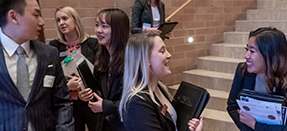DU Alums Saving Cell Phones, One at a Time
Former engineers create way to save electronics that get wet
So many of us have had that sinking feeling: You drop your cell phone in the toilet, or your key fab gets drenched in the rain, or you spill your drink on your computer and it no longer works.
“People have to know that a solution even exists for them to go and Google it,” says Adam Cookson, a 2013 alumnus of the executive MBA program at the Daniels College of Business. He’s the co-founder and CEO of a company called TekDry. Its mission is to rescue your electronic device when the unthinkable happens.
“Initially we felt like the engineering might be the tough part of this, but what’s been surprising is how difficult it has been from a marketing perspective to get the word out there for something new,” says Craig Beinecke, also a 2013 alum of the executive MBA program and co-founder and vice president of sales for TekDry.
Cookson and Beinecke met while attending a class on innovation. They were both engineers looking to expand their skill sets when they arrived at DU. All it took was an undergraduate student to drop her phone in a toilet for them to realize what they wanted to do next.
“We realized at that point that this was a global problem, and we focused our time and efforts to find a solution,” Cookson says. “Our engineering backgrounds helped us figure out the science and make it a reliable, repeatable process.”
They used their time in the MBA program to figure out the business side of their project. A pivotal moment came during their international trip to Tel Aviv and Istanbul. They were pitching their idea to a company, and part way through the presentation, they were asked if this was a real thing or just a class project. At that point they realized their idea could become a real thing.
The next two years saw a slow process of obtaining patents, leaving their full-time jobs, raising capital and testing their product in local malls. But in 2015, the company really started to take off. Cookson and Beinecke finally had a manufacturer, so they no longer had to build their machines by hand. That allowed them to ink their first contract with Staples to be in 82 stores.
“One of the reasons this works so well for Staples is that it drives traffic into their stores,” Cookson says. “This is a service you physically have to go to. People come into the store, use the service, have an awesome customer experience, and they shop while they are waiting for their phone.”
Only two months later Staples came calling again. Their service was so successful the big box store wanted to expand to 600 stores across the country. They are now in the process of building 500 additional machines.
As technology improves, new phones are hitting the market claiming to be water resistant. The co-founders of TekDry don’t see this as a threat to their company.
“We fix phones all the time that have gone through scenarios that would not have been protected by the limited water resistance that is offered,” Cookson says. “There are 7 billion phone handsets already on the planet. We don’t need to service but a tiny fraction of that to wildly exceed our financial goals.”
While it would be difficult for Cookson and Beinecke to be where they are today without their engineering backgrounds, Beinecke says the same thing can be said about what they learned at DU’s executive MBA program. “We’ve hired college graduates and interns from DU, we’ve met a lot of our investors through DU, we’ve made some of our first store partners through DU, and we continue to find more ways to use the network from the University.”
Together, Cookson and Beinecke continue to find ways to improve their product and their service — making it smaller, more affordable and faster. Currently, it takes about 30 minutes to save a phone or smaller electronic device. A laptop usually takes longer. Saving a key fab or flip phone costs $39.99, while saving a cell phone and other wearable electronics costs $69.99. To rescue a laptop costs $99.99. Customers only pay if the rescue works and everything operates as it did before getting wet. Never plugging in a wet device and brining it in for service quickly are the two best ways to help ensure a successful rescue using TekDry.
To find a location near you that has a TekDry machine, click here.








